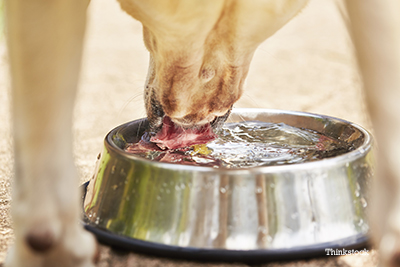
The simplest reason that people or animals drink is because they are thirsty. Their body is becoming low on water and they must drink to make up the losses. Since dogs don’t sweat, except from their nose and foot pads, they eliminate body heat by panting. When they pant a lot, they lose water through evaporation. This water loss is physiologic and can be readily replenished by drinking.
Excess water intake that goes beyond a normal amount, or that occurs without cause, may be a sign of disease. In a variety of conditions the body is not able to control water loss even at normal temperatures. This water loss must be replenished and so dogs drink a lot to find a balance.
How much water intake is normal in a healthy dog?
Generally, water intake will vary a little with diet. If dogs are fed wet food, they may drink less, while dogs that are fed dry food or salty treats must make up water intake and seem to drink more than expected. However, this water intake is still physiologically normal.
A good general guideline is that a healthy dog should drink between 20-70ml/kg per day1. Being aware of your dog’s water intake is important because drinking too little water can lead to dehydration while drinking too much water can be an indication of organ disease. If your dog is drinking more, he’ll probably also be peeing more (another sign of a potential problem). In fact, increased intake is often a response to excess fluid loss in urine.
If your dog is drinking excessively (polydipsia) it is possibly because he is losing excess amounts of water for any of a number of reasons. While a number of diseases result in excess water intake and urine output, the most common of these diseases include kidney failure, diabetes mellitus and Cushing’s disease.
An uncommon cause of dogs drinking more is called psychogenic polydipsia. It is a behavioral condition with a physical manifestation of excess thirst. Primary polydipsia is used to describe excessive water drinking that is not due to illness or psychosis: bored puppies or water loving breeds may tank up on water occasionally or consistently. Sorting these out can be a real challenge for your veterinarian.
Some medications, such as cortical steroids often have increased water intake as a side effect.How should increased thirst and drinking be managed?
Drinking excessive amounts of water often is associated with increased urination. While drinking a lot of water is a sign of health problems, increased urination can be a real problem for you to live with since affected dogs often urinate inappropriately.
The first and most important step in addressing excessive drinking is to diagnose and confirm the underlying condition with your veterinarian. Many of the conditions associated with excess thirst are very serious and must be addressed as soon as possible:
- Kidney disease
- Diabetes mellitus
- Hypercalcemia (high blood calcium)
- Pyometra (uterine infection in unspayed females)
These are all complicated and progressive diseases. It is important that these conditions be confirmed and controlled before they result in irreversible damage.
What not to do if your dog is drinking a lot
- Never restrict access to water in an effort to reduce water intake. Restricting water may well result in dehydration and fluid imbalances that will make conditions worse.
- Never ignore the problem. The conditions that cause these changes are very serious and can be fatal.
What should you do if your dog is drinking a lot of water?
Schedule an appointment with your veterinarian as soon as possible.
How will my veterinarian diagnose my dog’s condition?
Initially, your veterinarian will perform a number of blood and urine tests. Additional tests may be needed to further identify and regulate the condition.
The only way to reduce water intake is to manage the underlying condition. Most of these conditions can be regulated and your dog can go on to lead a normal life of good quality.
If you have any questions or concerns, you should always visit or call your veterinarian -- they are your best resource to ensure the health and well-being of your pets.
Resources:
- Kirk’s Current Veterinary Therapy XIII. WB Saunders. Philadelphia, 1999. p.831.

Dog Kidney Disease Articles
Chronic Kidney Disease: What Does Kidney Failure in Dogs Really Mean?
10 Common Causes of Kidney Disease in Dogs